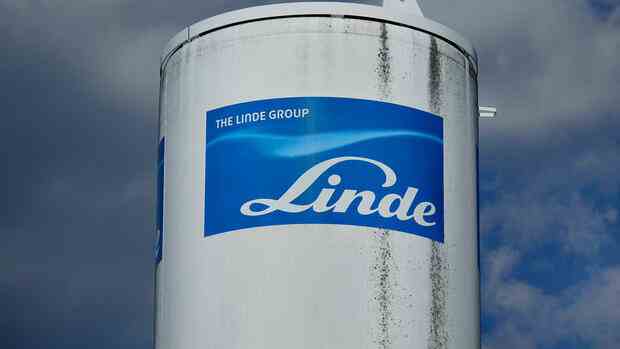Munich The currently most valuable Dax group Linde is about to withdraw from the financial center Germany. At an extraordinary general meeting on Wednesday, the shareholders of the world’s largest industrial gases group are to decide on the so-called delisting. The group would also fall out of the leading German index. However, some funds oppose the plan.
When Linde merged with US competitor Praxair in 2018, both sides asserted that the new group was planning a double listing in the US and Germany. However, the share price developed so well that funds that map the Dax had to sell shares again and again. Because there is a cap of ten percent for the weight of a single value in the leading index. These sales then in turn depressed the course.
Nevertheless, there was resistance to the plans from the German fund companies. “The delisting is a disappointment,” said Ingo Speich, Head of Sustainability and Corporate Governance at Deka Investment. The decision shows that ultimately Praxair took over Linde. “It was a takeover through the back door.” Some of the Deka customers can no longer invest in Linde shares.
Union Investment rejects the withdrawal
Union Investment also voted against the delisting. From the management’s point of view, the step seems “at least understandable,” said fund manager Arne Rautenberg. Nevertheless, one sees the step critically, since it leads to a “significant reduction in the volume of the German stock market”. The fund company has invested around 2.5 billion euros in Linde shares.
Top jobs of the day
Find the best jobs now and
be notified by email.
Linde currently has a market capitalization of around 150 billion euros, putting it well ahead of SAP and Siemens. The problem with the capping limit was somewhat smaller with the expansion of the Dax to 40 members, but Linde hit the limits again.
The double listing has served well, but it has slowed down the price development, said Linde boss Sanjiv Lamba at the end of last October. The majority of trading in Linde shares has already taken place on Wall Street in recent years. Since the merger, the company’s official registered office has been in Ireland, and its tax domicile is Woking near London.
A majority of 75 percent is required for the decision. Acceptance of the proposal is considered likely, but failure is not entirely impossible. However, staying in Frankfurt is not a problem for Linde, according to industry circles.
The AGM will be held in Danbury, Connecticut, USA. Linde is largely managed operationally from the former Praxair headquarters. Unlike in Germany, such shareholder meetings in the USA only last very briefly.
For the German stock exchanges, the decision means a step backwards. “It is a great pity for the financial center that Linde is planning to leave the Frankfurt price list,” said Christine Bortenlänger, head of Deutsches Aktieninstitut. Above all, the decision “in favor of New York” shows that the capital market in Germany is not yet competitive.
Critics see fusion as a secret takeover by the Americans
To a certain extent, both critics and supporters of the merger, which was heavily disputed at the time, can now see themselves confirmed. The sharp rise in the price of Linde shares in recent years shows that the industrial logic has been confirmed so far. In the industrial gases industry, which is dominated by a few suppliers, size is an important value. Lamba and his predecessor Steve Angel were able to continue to improve margins and raise profit targets.
On the other hand, IG Metall and employee representatives in particular had criticized that the merger promoted by former supervisory board chairman Wolfgang Reitzle was not a merger of equals, but a disguised takeover by the Americans.
The promises that the company would remain listed in Germany had not been kept, criticized the union representative Daniele Frijia from IG Metall. The parts of the leadership in the USA no longer see Linde as part of the old “Deutschland AG”.
The pure “shareholder value” orientation harbors the risk that “the interests of the workforce will not be given enough attention in the long term”. However, the trade union does not measure corporate management on the stock exchange, but on how it treats employees. And it is good that a significant part of the operational management is based in Germany.
Plant engineering, for example, is still managed from Germany. Above all, Pullach near Munich has remained an important global location. Nevertheless, according to insiders, the weighting has shifted towards the USA in recent years.
So there is a lot of discussion in Germany about Linde’s farewell – and about the cap that triggered it. This is “a purely German issue,” said fund manager Rautenberg. In his opinion, the problem would be solved if the legislature gave funds the freedom to weight individual values with more than ten percent. Only then does it make sense to weight individual values higher in the index.
More: Equities, real estate, private equity – this is how asset managers invest now.
